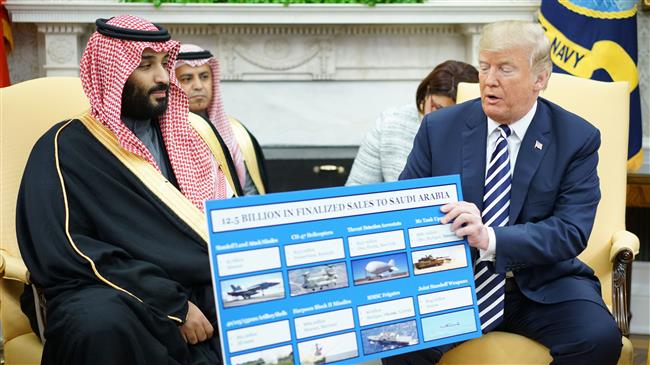
RNA - He first claimed he is determined to tackle this matter at the “highest levels.” Now Trump is walking back the issue, insisting that it isn’t worth it for the US to imperil $110 billion in arms sales to Saudi Arabia over a single journalist. Trump says it wouldn’t be acceptable to lose the $110 billion deal, adding that the journalist’s disappearance took place in Turkey, and he’s not a United States citizen.
Trump, as with many recent presidents, has prioritized the relationship between Saudi Arabia and the United States over that of the journalist’s death. He has even specifically warned against upsetting Saudi leaders as it could hurt the US monetarily. “I don’t like stopping massive amounts of money that’s being poured into our country,” Trump said, according to a tweet this week. He added, “they are spending $110b on military equipment and on things that create jobs for this country.”
This is not something of a surprise:
- The arms deal is simply too important to US arms companies, and any serious attempt to punish the Saudis for the killing of Khashoggi is going to boil down to a fight over the arms deal. After all, this is the same autocratic regime that has been murdering thousands of Yemeni people since 2015 and the US government has done nothing to stop the conflict, much less stop its arms supply or refuelling Saudi aircraft mid-air.
- Saudi Arabia is no different than the other authoritarian, violent, and despotic regimes that have dominated the region since the dissolution of the Ottoman Empire. Saudi Arabia is a harsh place, where politically-motivated assassinations and unsavoury governing practices are as commonplace as the oil flowing underneath its sands. To view Saudi Arabia as above the region’s other Arab states is not matched by the facts.
- The relationship between the US and Saudi Arabia is not rooted in common beliefs, shared values and ethics. It is rooted in identical foreign policy interests to dominate the region and protect Israel. Such ties are the reason why Yemen and Syria are in turmoil. They are also the reason why ISIL and Al-Qaeda, the US-Saudi foot soldiers, are still present throughout the region.
- Saudi Arabia is not the answer to the region’s many problems, as Trump would like to suggest. It is in fact the root cause of all regional problems. The despotic regime has taken maximum advantage of America’s appetite for controlling crude market and a desire for a long-term regional partner in crime in order to press its own Takfiri-Wahhabi agenda in the region. This agenda is centred on the regime’s rivalry with Iran and its absolutist quest for hegemony. The United States, having interest in the sectarian fault-lines of the Middle East, has frequently chosen to wade into Arab conflicts on Saudi Arabia’s side.
- Saudi Arabia’s indiscriminate bombing campaign in Yemen, its embargo of Qatar and its export of Wahhabi ideology are not exactly helpful in assuring US security. Many of those who carried out terror attacks in the US were from Saudi Arabia. Riyadh’s war on Yemen, and Washington’s logistical assistance to the Saudi Air Force in particular, has been especially devastating to the people of that destitute country and America’s reputation among the Yemeni population — all the while providing more operating space for the very transnational terrorist groups the US and Saudi Arabia claim to combat in the Peninsula.
- Khashoggi's story now displays pretty well that the Saudi regime is not concerned about women’s rights, press freedom, due process, political pluralism, and individual freedom, but focused on perpetuating its control and subjugating its smaller Persian Gulf neighbours into vassal states. Saudi Arabia has never been a helpful partner in ensuring regional security and peace. Saudi and Persian Gulf Arab money have been absolutely essential in creating and arming ISIL and Al-Qaeda.
According to Fars News Agency, in the prevailing environment, it is silly to assume that Trump will ever upend the terms of the decades-long alliance between the United States and Saudi Arabia. US politicians, media figures and foreign policy elites - even those who have fawned over the authoritarian Saudi Crown Prince Mohammad bin Salman – will never criticize the continuation of US-Saudi alliance. Quite the opposite, the US will continue to give the Saudis a blank check, politically and militarily, for nearly as long as it can last.
In between, in Washington who cares if the Saudis kidnapped, tortured and assassinated Khashoggi inside their consulate in Istanbul? After all, Saudi Ambassador Khalid Bin Salman has told the US that the consulate cannot provide video footage of the consulate because they only have livestreaming, not recorded video! Again, who cares if this is the only consulate in the world that doesn’t tape - and didn’t tape its own nefarious activity.
Therefore, don’t expect the White House to rush to judgment. Because all of this and more have already passed the smell test in Washington. This particular murder case will never call the relationship between Saudi Arabia and the United States into fundamental question because Trump says jobs would be at risk if arms sales to the country were halted.
847/940